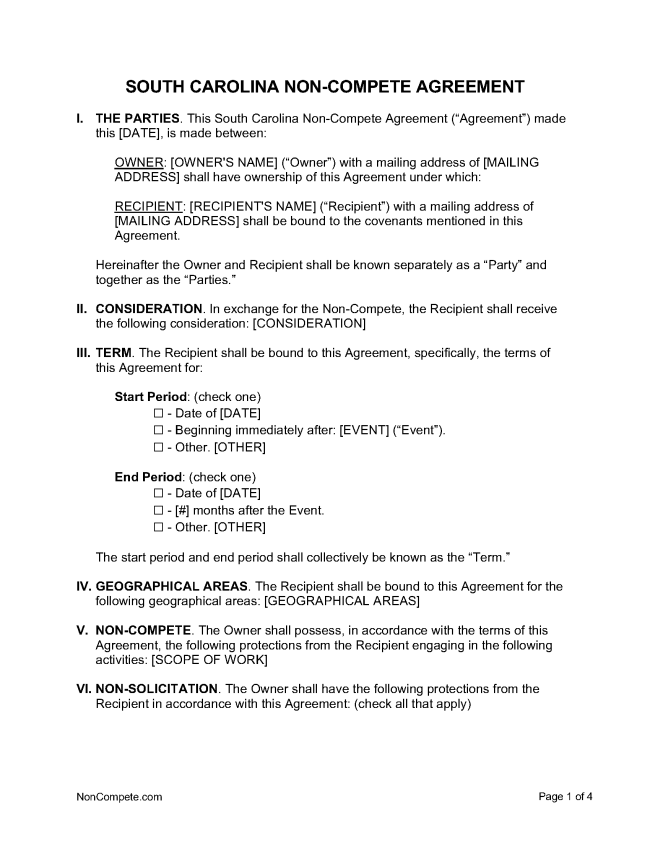A South Carolina non-compete agreement is a set of contractual terms that limit the ability of a worker or an entrepreneur to pursue a particular line of business. Although South Carolina law disfavors non-compete agreements, they are valid in the state under limited circumstances. The state does take a relatively harsh view on duration and geographic reach of non-competes: if these are not limited, the entire agreement will be struck down.
Table of Contents |
Are Non-Competes Enforceable in South Carolina?
Non-competes are strictly construed against employers. An agreement may be enforceable if it is:
- Necessary for the protection of a legitimate business interest of the employer;
- Reasonably limited in times of duration and geographic reach;
- Not unduly harsh and oppressive toward the employee’s attempts to earn a living
- Reasonable, in terms of according with public policy;
- Supported by valuable consideration.
Milliken & Co. v. Morin (2009).
Sale of Business vs. Employment Contract
Non-compete agreements involving business are examined at a more relaxed level than those involving employment contracts. (Palmetto Mortuary Transport, Inc. v. Knight Systems, Inc. (2018)).
Protectable Interests
The following are considered legitimate protectable interests that can justify a non-compete agreement:
- Preventing the raiding of the former employer’s clients;
- The goodwill associated with the former employer’s business;
- Trade secrets; and
- Other confidential business information.
Almers v. South Carolina Nat’l Bank of Charleston (1975).
Geographic Reach
A non-compete that does not contain some specific limitation on its geographic reach is considered in violation of South Carolina public policy and is automatically void. (Stonhard, Inc. v. Carolina Flooring (2005))
Attorneys (prohibited)
Non-compete agreements that limit an attorney’s ability to practice in the future are not enforceable when contained in:
- An employment contract;
- A partnership, stakeholder or operating agreement, except for limited, reasonable restrictions in contracts for the sale of a law practice; or
- A case settlement.
Rule 5.6, South Carolina Rules of Professional Conduct.
Terminating an Employee
South Carolina courts have not yet decided whether terminating an employee makes a non-compete agreement unenforceable. However, in Associated Spring Corp. v. Roy F. Wilson & Avnet, Inc. United (1976), a South Carolina federal district court ruled that South Carolina law prevents an employer who breached an employment contract from later enforcing a non-compete agreement in the contract.
Burden of Proof
An employer trying to enforce a non-compete agreement has the burden of proving the reasonableness of the agreement. (Kadis v. Britt (1944)).
Continued Employment (consideration)
If an at-will employee is already working for an employer, merely allowing the employee to continue employment is not sufficient consideration to justify a non-compete agreement. (Poole v. Incentives Unlimited, Inc. (2001)).
Maximum Term
In the context of a non-compete agreement in an employment contract, durations of two or three years are generally acceptable, while those with no time limit at all are never justified. (Rental Uniform Service of Florence, Inc. v. Dudley (1983)).
Longer periods may be acceptable in a non-compete agreement associated with the sale of a business. In Cafe Associates, Ltd. v. Gerngross (1991), the Supreme Court of South Carolina upheld a five-year non-compete agreement in the sale of a restaurant.
Blue Penciling
Courts are not permitted to modify unreasonable non-compete agreements. (Poynter Invs., Inc. v. Century Builders of Piedmont, Inc. (2010)).
